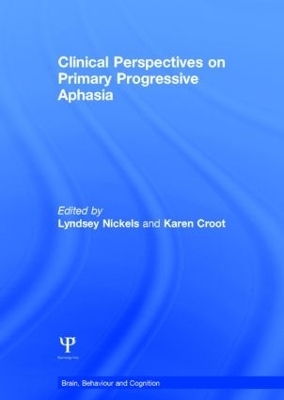
Clinical Perspectives on Primary Progressive Aphasia
Psychology Press Ltd (Verlag)
978-1-138-85346-1 (ISBN)
This book is suitable for a wide readership, from neurologists, geriatricians and other medical specialists, to general practitioners, speech and language therapists, occupational therapists, psychologists and students in these fields. It was originally published as a special issue of the journal Aphasiology.
Professor Lyndsey Nickels is a speech pathologist and Research Professor at Macquarie University, Australia. She is known internationally for her theoretical and applied research on language impairments and their treatment. Dr Karen Croot is a lecturer in Applied Cognitive Psychology at the University of Sydney, Australia. She is a respected authority on primary progressive aphasia, having been researching in the field since 1993.
1. Introduction: Understanding and living with primary progressive aphasia: Current progress and challenges for the future Lyndsey Nickels and Karen Croot 2. Our journey with primary progressive aphasia Shirley Rutherford 3. Differential diagnosis of primary progressive aphasia variants using the international criteria Cristian E. Leyton and John R. Hodges 4. Biomarkers in the primary progressive aphasias Murray Grossman 5. The genetics of primary progressive aphasia Jonathan D. Rohrer 6. Longitudinal imaging and deterioration in word comprehension in primary progressive aphasia: Potential clinical significance Andreia V. Faria, Rajani Sebastian, Melissa Newhart, Susumu Mori, and Argye E. Hillis 7. The patterns of progression in primary progressive aphasia: Implications for assessment and management Michał Harciarek, Emilia J. Sitek, and Andrew Kertesz 8. Long-term follow-up in primary progressive aphasia: Clinical course and health care utilisation Lina Riedl, Dirk Last, Adrian Danek, and Janine Diehl-Schmid 9. Use of the Progressive Aphasia Severity Scale (PASS) in monitoring speech and language status in PPA Daisy Sapolsky, Kimiko Domoto-Reilly, and Bradford C. Dickerson 10. Motor speech disorders associated with primary progressive aphasia Joseph R. Duffy, Edythe A. Strand, and Keith A. Josephs 11. Grammatical impairments in PPA Cynthia K. Thompson and Jennifer E. Mack 12. Word retrieval therapies in primary progressive aphasia Regina Jokel, Naida L. Graham, Elizabeth Rochon, and Carol Leonard 13. Trouble and repair during conversations of people with primary progressive aphasia Cathleen Taylor, Karen Croot, Emma Power, Sharon A. Savage, John R. Hodges, and Leanne Togher 14. Dysgraphia in primary progressive aphasia: Characterisation of impairments and therapy options Naida L. Graham 15. Augmentation of spelling therapy with transcranial direct current stimulation in primary progressive aphasia: Preliminary results and challenges Kyrana Tsapkini, Constantine Frangakis, Yessenia Gomez, Cameron Davis, and Argye E. Hillis 16. Functional disability in primary progressive aphasia Claire M. O’Connor, Samrah Ahmed, and Eneida Mioshi
| Reihe/Serie | Brain, Behaviour and Cognition |
|---|---|
| Verlagsort | Hove |
| Sprache | englisch |
| Maße | 174 x 246 mm |
| Gewicht | 657 g |
| Themenwelt | Geisteswissenschaften ► Psychologie ► Biopsychologie / Neurowissenschaften |
| Geisteswissenschaften ► Psychologie ► Entwicklungspsychologie | |
| Medizin / Pharmazie ► Gesundheitsfachberufe ► Logopädie | |
| ISBN-10 | 1-138-85346-1 / 1138853461 |
| ISBN-13 | 978-1-138-85346-1 / 9781138853461 |
| Zustand | Neuware |
| Haben Sie eine Frage zum Produkt? |
aus dem Bereich


